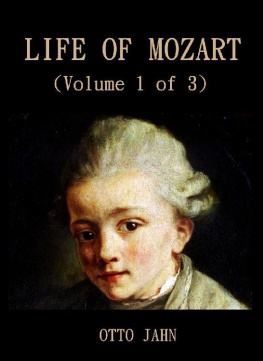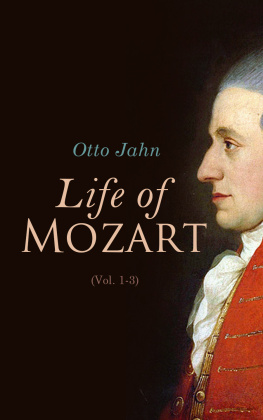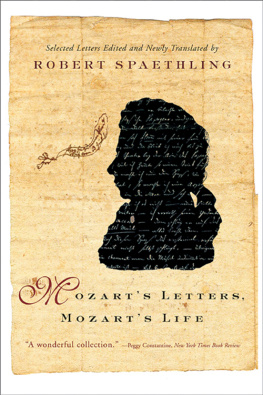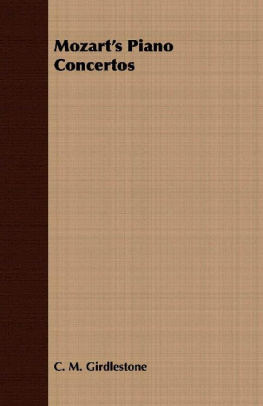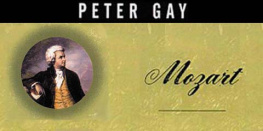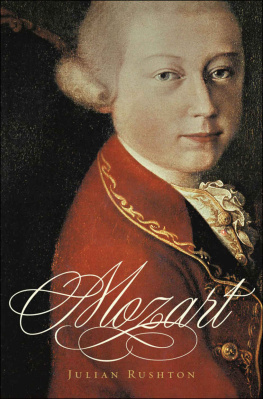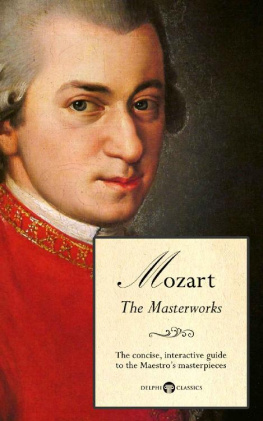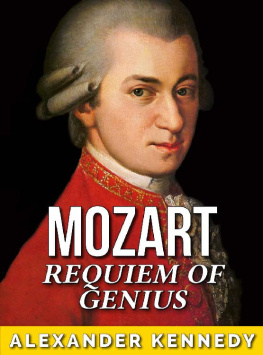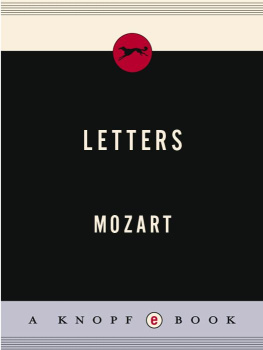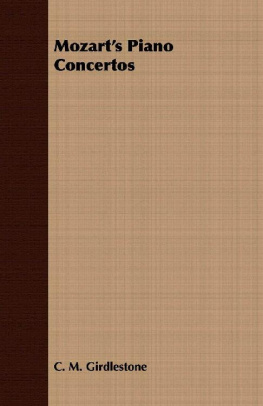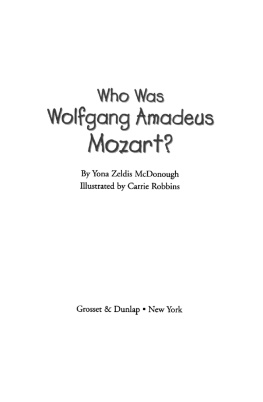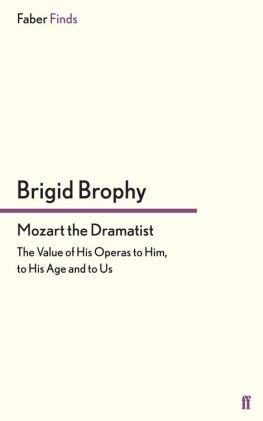LIFE OF MOZART
By Otto Jahn.
Translated From The German By Pauline D. Townsend.
With A Preface By George Grove, Esq., D.C.L.
In Three Volumes. Vol. I.
London:
Copyright 1882.
Contents
CHAPTER I. CHILDHOOD
WOLFGANG AMADE MOZART came of a family belonging originally to the artisan class. We find his ancestors settled in Augsburg early in the seventeenth century, and following their calling there without any great success.[1001] His grandfather, Johann Georg Mozart, a bookbinder, married, October 7, 1708, Anna Maria Peterin, the widow of another bookbinder, Augustin Banneger.2 From this union sprang two daughters and three sons, viz.: Fr. Joseph Ignaz, Franz Alois (who carried on his father's trade in his native town), and Johann Georg Leopold Mozart, bom on November 14, 1719, the father of the Mozart of our biography.8 Gifted with a keen intellect and firm will he early formed the resolution of raising himself to a higher position in the world than that hitherto occupied by his family; and in his later years he could point with just elation to his own arduous efforts, and the success which had crowned them, when he was urging his son to the same steady perseverance.
When Wolfgang visited Augsburg in 1777, he gathered many particulars of his father's youth which refreshed the recollections of Leopold himself. We find him writing to his son (October 10, 1777) how, as a boy, he had sung a cantata at the monastery of St. Ulrich, for the wedding of the Hofrath Oefele, and how he had often climbed the broken steps to the organ loft, to sing treble at the Feast
{CHILDHOOD.}
(4)
of the Holy Cross (November 29, 1777). He afterwards became an excellent organist: a certain Herr von Freisinger, of Munich, told Wolfgang (October 10, 1777) that he knew his father well, he had studied with him, and "had the liveliest recollections of Wessobrunn where my father (this was news to me) played the organ remarkably well. He said: 'It was wonderful, to see his hands and feet going together, but exceedingly fineyes, he was an extraordinary man. My father thought very highly of him. And how he used to jeer at the priests, when they wanted him to turn monk.'" This last must have been of peculiar interest to Wolfgang, who knew his father only as a devout and strict observer of the Catholic religion. But Leopold remembered the days of his youth, and wrote to his wife (December 15, 1777): "Let me ask, if Wolfgang has not of late neglected to go to confession? God should ever be first in our thoughts! to Him alone must we look for earthly happiness, and we should ever keep eternity in view; young people, I know, are averse to hearing of these things; I was young myself once; but God be thanked, I always came to myself after my youthful follies, fled from all dangers to my soul, and kept steadily in view God, and my honour, and the dangerous consequences of indulgence in sin."
Long-continued exertions and self-denial laid the foundation of Leopold Mozart's character in a conscientious earnestness and devotion to duty in great things as in small; they had the effect also of rendering his judgment of others somewhat hard and uncompromising. This is observable in his relations as an official, and as a teacher, and in his dealings on matters of religion. He was a strict Catholic, and feared nothing so much for his children as the influence which a prolonged stay in Protestant countries might exert on their faith; he remarked with surprise that his travelling companions, Baron Hopfgarten and Baron Bose, had often edified him with their discourse, although they were Lutherans (Paris, April 1, 1764).
When in London, he became acquainted with the excellent violoncellist Siprutini, son of a Dutch Jew, who had broken loose from Judaism and "was content to believe in
{L. MOZART'S CHARACTER.}
(5)
one God, to love Him first, and his neighbour as himself, and to live an honest life"; L. Mozart gained an acknowledgment from him that of all the Christian creeds the Catholic was the best, and was not without hope of converting him altogether (September 13, 1764).
He fulfilled all the duties which the Church requires of her children with conscientiousness and zeal; we find him ordering masses to be said, buying relics, &c., whenever occasion offers.
The strictly orthodox, almost ascetic, rules of life which the reigning archbishop, Sigismund, followed and enforced in his court and in all Salzburg must have had the effect of deepening this side of L. Mozart's character; while the greater freedom in church matters enjoyed under Sigis-mund's successor, Hieronymus, was not without its influence, evinced by his becoming late in life a freemason. There can be no doubt that L. Mozart was a man of genuine piety, which stood firm amid strong temptations and the most trying circumstances. It was in accordance with his education and position in life that this piety found no better justification and expression than those provided by his Church. His performance of his duties to God and the Church was undertaken in the same rigorous spirit which characterised him in all the relations of life. But he was too sensible not to remonstrate with his daughter when she chose rather to endanger her health than to be absent from mass (July 28, 1786). He was entirely free from superstition, and when some one wrote to him of a ghost-story he declared that "it must be only an hysterical illusion of the maid-servant." Again, he had "invariably found that begging sisterhoods were the signs of much moral degradation concealed under the cloak of hypocrisy" (December 16, 1785). It would be a great mistake to consider the elder Mozart as a narrow-minded bigot. United to a shrewd, clear intellect, for the cultivation of which he made extraordinary efforts, he possessed a decided turn for raillery and sarcasm. His painful endeavours to work himself free of his petty surroundings, his habit of looking beyond the narrow horizon which encircled him, encouraged in him a cynical
{CHILDHOOD.}
(6)
turn of mind. It grew to be a settled conviction with him that selfishness is the only motive of human action on which we can safely reckon, and which, therefore, we must strive to turn to account: a belief in disinterested philanthropy or friendship is a folly which seldom goes unpunished. Nor should we have any faith in an innate love of truth. "Take it as an universal truth," he writes (October 6, 1785), "all men tell lies, and add to the truth, or take away from it, just as it suits their purpose. Especially must we believe nothing which, if known, would add to the reputation of the speaker or flatter his interlocutor, for that is sure to be false." This distrust of mankind he sought to implant in his son, but with very little success. Nor did his gloomy views of life stifle, even in himself, all emotion and sentiment. His theory, as so often happens, went farther than his practice. When Leopold Mozart analysed the conduct of men, his criticism was sharp and cutting, but he was always ready with counsel and assistance when they were needed. Notwithstanding his piety he expressed bitter contempt for the priesthood and priestcraft: he had occasion to know both intimately. He was never dazzled by the distinctions of birth and position. He judged those nearest and dearest to him, not excepting his beloved son, as severely as the rest of the world. It had the most wholesome effect on the development of Mozart's character and genius that his father, who loved him as only a father can love, who justly estimated and admired his artistic genius, was never dazzled by it, never ignored nor concealed his weaknesses, but warned and blamed him, and strove to bring him up with a conscientious fidelity to duty.
Leopold Mozart was aware that the education of his son was the highest and greatest task of his life; but this absorbing care did not narrow his breadth of sympathy, nor lessen his consideration for others bound to him by natural ties; he proved himself always a devoted friend as well as, for one of his means, a liberal benefactor.

